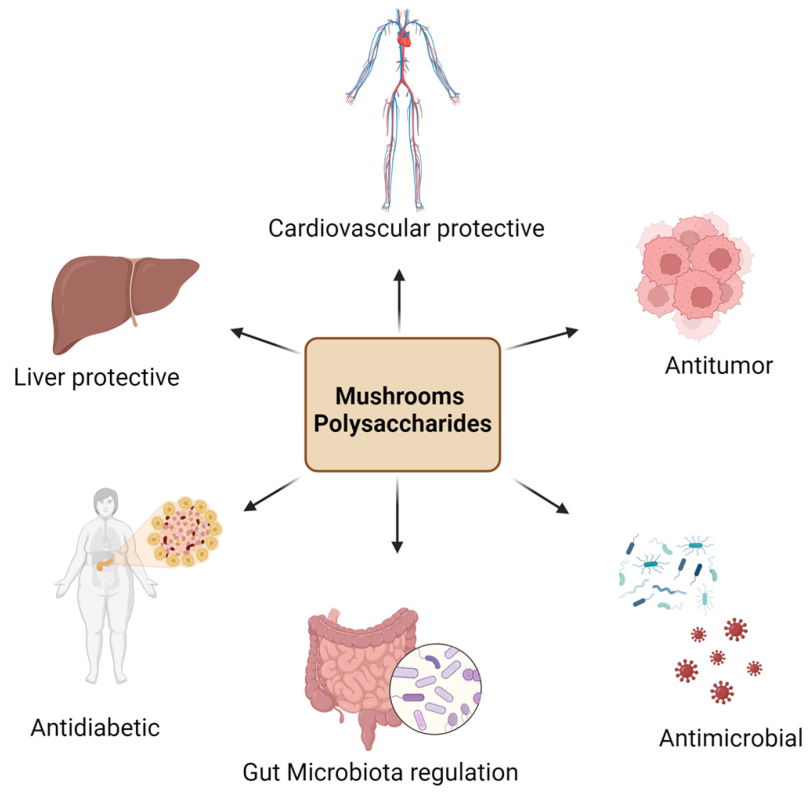Cannabis, CBD, Magic Mushrooms
🧬 Understanding Beta-Glucans: The Powerhouse Compounds in Mushrooms
Why These Natural Polysaccharides Are the Secret Behind Mushroom Health Benefits
When it comes to the growing popularity of functional mushrooms, there’s one group of compounds doing the heavy lifting behind the scenes: beta-glucans. Often overlooked by casual supplement users, these naturally occurring polysaccharides are the core bioactive components that give medicinal mushrooms their immune-boosting, anti-inflammatory, and adaptogenic powers.
But what exactly are beta-glucans? How do they interact with the human body? And why are they so important when choosing a mushroom supplement?
Let’s explore the science behind beta-glucans and why they deserve a spot in your wellness vocabulary.
🍄 What Are Beta-Glucans?
Beta-glucans are naturally occurring polysaccharides, or complex sugars, found in the cell walls of certain fungi, bacteria, yeasts, and grains like oats and barley. But the beta-glucans found in mushrooms have a unique branching molecular structure that sets them apart from grain-based beta-glucans—and gives them a unique effect on the immune system.
The Key Structure:
Mushroom beta-glucans are primarily glucans, a complex configuration that allows them to interact with immune cells more effectively than the beta-glucans found in cereals
This unique branching structure is what makes mushroom beta-glucans biologically active and capable of triggering a potent immune-modulating effect.
🛡️ How Beta-Glucans Support the Immune System
Beta-glucans are often referred to as biological response modifiers. Rather than simply boosting the immune system (which can be risky in autoimmune conditions), they help balance and train it—making your immune responses smarter and more efficient.
Here’s how it works:
- Beta-glucans are recognized by receptors on immune cells such as:
- Macrophages
- Dendritic cells
- Natural Killer (NK) cells
- Neutrophils
- This recognition primes the immune cells—helping them detect and respond more quickly to pathogens like viruses, bacteria, and even abnormal cells (e.g., cancer cells).
- The immune response becomes more adaptive rather than reactive, helping reduce overreactions (like chronic inflammation) and enhancing resilience over time.
✅ The result: stronger, smarter immunity without overstimulation.
🧪 Beta-Glucans and Scientific Research
The immune-modulating effects of mushroom beta-glucans have been well documented in both clinical trials and laboratory studies.
Highlights:
- Turkey Tail (Trametes versicolor): Contains PSP and PSK—two powerful beta-glucan complexes used in oncology settings in Japan as adjunct immune therapies.
- Reishi (Ganoderma lucidum): Rich in beta-glucans and triterpenes, shown to support immune balance, inflammation reduction, and even enhance vaccine response.
- Shiitake: Contains lentinan, a well-studied beta-glucan used for immune enhancement in cancer support protocols.
- Maitake: Contains D-fraction beta-glucans, which stimulate natural killer (NK) cell activity.
These studies suggest that beta-glucans may help with:
- Preventing colds and flu
- Supporting immune-compromised individuals
- Enhancing outcomes during cancer treatment
- Reducing systemic inflammation
🌿 Other Benefits of Beta-Glucans
While most known for immune support, beta-glucans offer additional wellness perks:
✅ Anti-inflammatory
They help regulate cytokine production and suppress chronic inflammation, a major factor in aging and many modern diseases.
✅ Antioxidant Support
By modulating oxidative stress, beta-glucans protect cells and DNA from damage caused by free radicals.
✅ Gut Health
Mushroom beta-glucans act as prebiotics, feeding beneficial gut bacteria and improving digestion and gut lining integrity.
✅ Metabolic Support
Some studies show beta-glucans may improve cholesterol levels and blood sugar regulation, particularly when combined with a healthy diet.
🏷️ What to Look for in Mushroom Supplements
Not all mushroom products are created equal—and when it comes to beta-glucans, transparency is key.
Choose mushroom products that:
- ✅ Specify “fruiting body” extract (not just mycelium on grain)
- ✅ Clearly list beta-glucan content (ideally 20% or higher)
- ✅ Use dual-extraction methods to pull both water-soluble (like beta-glucans) and alcohol-soluble compounds (like triterpenes)
- ✅ Are third-party tested for purity and potency
🚫 Avoid products that only say “polysaccharide content”—this can include starches or non-active sugars from the substrate.
💡 How to Incorporate Beta-Glucans into Your Routine
Adding beta-glucan-rich mushrooms to your daily routine is easy:
- Morning: Add Lion’s Mane or Chaga powder to your coffee or smoothie for immune and cognitive support.
- Afternoon: Take Reishi or Turkey Tail capsules for immune balance and gut support.
- Evening: Brew a calming Reishi tea to wind down and recover.
- Workout days: Try Cordyceps to enhance oxygen utilization and energy metabolism.
Consistency is key—beta-glucans work gradually and cumulatively over time.
🌟 Final Thoughts
Beta-glucans are the unsung heroes behind the powerful effects of medicinal mushrooms. These complex compounds not only train your immune system, but also support overall wellness in ways science is just beginning to fully understand.
By choosing high-quality mushroom products with proven beta-glucan content, you’re not just following a trend—you’re tapping into an ancient, natural way to support long-term vitality and resilience.
🍄 In the world of functional fungi, beta-glucans are the bridge between tradition and science—and your key to deeper health.

